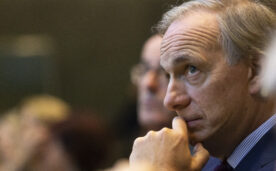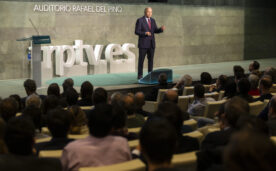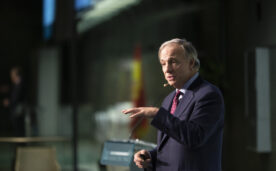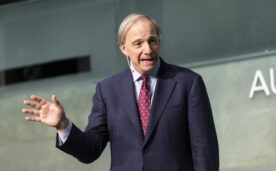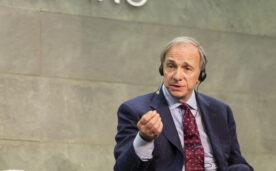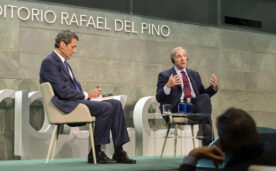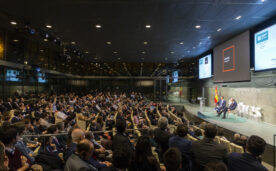Summary:
On 12 December 2018, the Rafael del Pino Foundation hosted a keynote lecture by Ray Dalio, entitled "Principles", on the occasion of the presentation of the book of the same name. Dalio, founder of Bridgewater Associates, indicated that his life is divided into three stages. In the first, you depend on others while you study and train. In the second, you enter the job market, other people depend on you and you try to succeed. Then you move to the third, where you try to make others succeed. To this end, he wrote the "Principles" that he follows when making decisions. The most important thing he wants to convey with his book is the idea that every time they had to make a decision, he wrote down the criteria that guided him in making it. Dalio observed that things were repeated over and over again and that, if he could write down the principles and tell them eloquently to other people, he was able to think in an orderly way and get people to understand them. If he wrote the principles down clearly enough, he could put them into equations, into algorithms. That's what he did with investments. By seeing how these algorithms worked over time, he was able to gain insights that he wouldn't have gotten if the rules hadn't been so clear. In this way, Dalio was creating a system for decision-making. Dalio always wanted to pursue ambitious and audacious goals, to squeeze the most out of life to achieve those goals. Along the way, he reaped successes and failures, but, for him, the failures were more important because each failure led him to reflect on it. From that experience he coined the idea that pain plus failure equals progress. In this way, he tried to achieve a better result in the future. This way of acting is a continuous loop that feeds back on itself. In his view, there are five steps to success. The first is to pursue the goals you set for yourself. The second is to understand that, while doing so, there will be failures, which may be due to one's own weaknesses or those of others. Understand those weaknesses, because by understanding them, they can be overcome. The third step is to diagnose the problems and get to the root of what is causing them. The fourth is to create a system to solve those problems and the fifth is to implement that system. This is a self-reinforcing experience. In this sense, it is important to accept that no one can get everything right, that everyone makes mistakes at some point. But that doesn't matter, because when you know your weaknesses and can build on the strengths of others, you can make your own limitations less of an obstacle. Dalio acknowledges that one of his worst failures came in the early 1980s. At that time, US banks had lent Latin American countries far more money than they could repay. This would lead to a debt crisis, which would turn into an economic crisis that was to be terrible. In August 1982, several countries suspended payments. I was then asked to speak before Congress and in the media. At that time he was very arrogant, he said that nothing was happening and that made his clients and himself lose a lot of money. That experience was very painful for Dalio, but it changed the way he made decisions. He began to question whether he was right or wrong in his thinking, to look for intelligent people who said otherwise, and to try to see things from their point of view. Most importantly, he developed the fear of being wrong, but without giving up his bold goals. That made him more successful. For him, the biggest challenge is for people to express their opinions without being afraid to do so. So he created a culture of it, because he wanted to pursue his goals, but, at the same time, he also wanted to confront someone with high ambitions, but contrary to his own, which would force him to seek a consensus. Now, to succeed, you have to think differently and go against the consensus. To do this well, he had to create a meritocracy of ideas. To create a meritocracy of ideas, you first have to put the most honest thoughts on the table. They may be uncomfortable ideas, but that way you know what others are thinking. Then you have to understand the art of disagreement because, if you can exploit differences, you increase the likelihood of getting it right. Then you have to create a set of agreed protocols to be able to overcome discrepancies. It's about knowing which people are good at which things and trying to use those strengths to overcome discrepancies. Another important issue is knowing when you are wrong and knowing each other's strengths and weaknesses. When you know what another person is like, you know what you can expect from them and assign them the role that suits them best. In a meritocracy of ideas, important relationships are established through a radical transparency that ultimately leads to a decision. In this context, it is sometimes uncomfortable to have someone's weaknesses pointed out to them. Therefore, when implementing a meritocracy of ideas, four questions need to be asked: whether you want to make decisions based on a meritocracy of ideas, whether you want to know what people are really like, to what extent you want honesty and radical transparency, and to what extent you want decision-making to be done with the help of algorithms.
The Rafael del Pino Foundation is not responsible for the comments, opinions or statements made by the people who participate in its activities and which are expressed as a result of their inalienable right to freedom of expression and under their sole responsibility. The contents included in the summary of this conference are the result of the debates held at the meeting held for this purpose at the Foundation and are the responsibility of their authors.
The Rafael del Pino Foundation is not responsible for any comments, opinions or statements made by third parties. In this respect, the FRP is not obliged to monitor the views expressed by such third parties who participate in its activities and which are expressed as a result of their inalienable right to freedom of expression and under their own responsibility. The contents included in the summary of this conference are the result of the discussions that took place during the conference organised for this purpose at the Foundation and are the sole responsibility of its authors.
